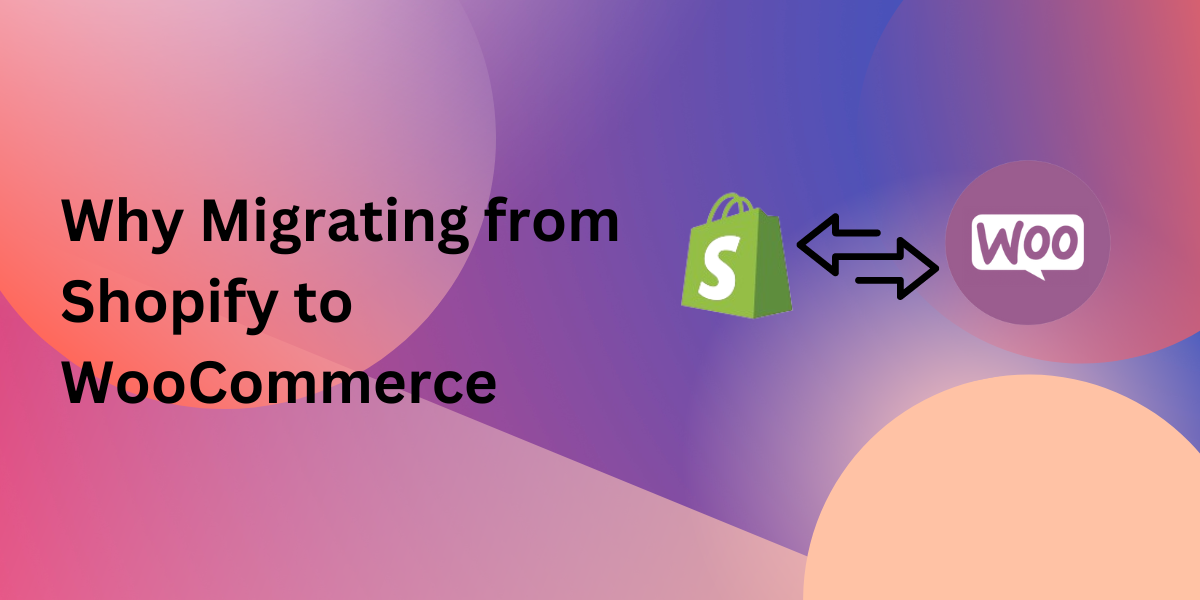If you’re an eCommerce business owner considering a platform switch, migrating from Shopify to WooCommerce could be the best decision for your online store. WooCommerce, an open-source eCommerce plugin built for WordPress, offers immense flexibility, customization, and affordability. In contrast, Shopify, a hosted platform, may seem convenient but has several limitations that could restrict the growth and scalability of your business. This article explores the key reasons why businesses are increasingly opting to migrate Shopify to WooCommerce.
1. Full Control and Customization
One of the most significant advantages of WooCommerce over Shopify is the level of control it offers. WooCommerce is a self-hosted, open-source platform, which means that you have complete ownership over your store’s data and full control over its design, functionality, and customization.
With WooCommerce, you can:
- Customize your store without restrictions. You’re not limited by proprietary themes or plugins, as WooCommerce allows deep-level customization through custom code or thousands of available themes and extensions.
- Modify every element of your website. Whether you want to change the layout, create custom checkout flows, or add new features, WooCommerce makes it possible without any limitations.
- Own your data: With WooCommerce, all your data is stored on your own server, unlike Shopify where data is stored on the platform’s servers. This means better control over privacy, data security, and site backups.
In contrast, Shopify is a closed platform, which means the customization options are limited. If you want specific functionality, you may have to rely on apps or themes from their marketplace, often at additional costs.
2. Cost-Effectiveness
When considering the financial aspect, WooCommerce can be a far more cost-effective option than Shopify, especially in the long run. While Shopify offers different pricing tiers (starting from $29/month for the Basic plan), each plan comes with additional fees for apps, themes, and transaction fees (if not using Shopify Payments).
WooCommerce Offers:
- Free core plugin: WooCommerce is free to install and use. While you may need to invest in hosting, themes, and premium plugins, the costs are typically lower than Shopify’s premium plans and fees.
- No transaction fees: WooCommerce doesn’t charge additional transaction fees, unlike Shopify, which imposes a 2.0% fee on each transaction unless you use Shopify Payments.
- Affordable hosting: With WooCommerce, you can choose your hosting provider and plan. This means you can start with a lower-tier hosting plan and scale up as your business grows. With Shopify, you’re locked into their hosting with no option to switch.
3. Greater Flexibility with Themes and Plugins
While Shopify offers themes and a variety of apps in its marketplace, WooCommerce provides far more flexibility and options in this area. There are thousands of free and premium WordPress themes, many of which are designed specifically for WooCommerce.
WooCommerce Benefits:
- A vast ecosystem of themes: You can choose from countless WooCommerce-compatible themes, offering much more variety in design and functionality. Themes are available for various business types, ranging from fashion and electronics to health and beauty.
- Extensive plugin support: WooCommerce is built on WordPress, which means it has access to over 50,000 plugins, allowing you to add almost any functionality to your store, including advanced SEO tools, analytics, marketing automation, and more.
Shopify also has a marketplace for apps, but many of them are paid, and the selection is narrower compared to WooCommerce’s ecosystem of plugins.
4. SEO Capabilities
WooCommerce offers better SEO capabilities compared to Shopify, thanks to its integration with WordPress. WooCommerce provides greater control over on-page SEO elements, such as meta descriptions, URLs, and headers, ensuring that your store is optimized for search engines.
WooCommerce’s SEO Features Include:
- Complete control over metadata: With WooCommerce, you can edit meta titles, descriptions, URLs, and more using popular SEO plugins like Yoast or Rank Math.
- Better blogging features: Since WooCommerce is integrated with WordPress, you have access to one of the most powerful blogging platforms. This allows you to create content that improves your SEO rankings and drives organic traffic.
- Customizable URLs: WooCommerce allows you to have clean, SEO-friendly URLs for all your products and pages. Shopify’s rigid URL structure is not as SEO-friendly, as it forces certain path structures.
Shopify does offer SEO tools, but the level of control is limited, especially for advanced SEO practices, making WooCommerce the better option for SEO-conscious store owners.
5. Scalability
If you anticipate your store growing in terms of products, traffic, and sales, WooCommerce is a much more scalable solution than Shopify. Because WooCommerce is self-hosted, you can easily upgrade your hosting plan as your traffic and sales increase. Shopify, on the other hand, has predefined limits on its plans, which may require costly upgrades or app purchases to accommodate growth.
WooCommerce Scalability Benefits:
- Custom hosting solutions: With WooCommerce, you can choose a hosting provider and plan that scales with your business, from shared hosting to dedicated servers.
- No platform restrictions: Since WooCommerce is open-source, there are no platform-imposed restrictions on the number of products you can list or the amount of traffic your store can handle.
In comparison, Shopify’s scalability comes with limitations. Higher pricing tiers are required as you scale, and certain features, such as advanced reporting, are only available in premium plans.
6. Migration Process with WooCommerce
Migrating from Shopify to WooCommerce is a straightforward process with the right tools. WooCommerce provides a Shopify to WooCommerce Migration Plugin that simplifies the migration of your product data, customer information, and order history.
Key Features of the Migration Plugin:
- Automated migration: The plugin handles data migration, ensuring your products, customers, and orders are transferred seamlessly from Shopify to WooCommerce.
- No downtime: You can continue to run your Shopify store while the migration is taking place, ensuring no interruptions to your business.
- Comprehensive data transfer: The plugin allows you to migrate essential store data, including product images, descriptions, customer details, and order history.
Once the migration is complete, you can begin customizing and enhancing your new WooCommerce store.
Conclusion
Migrating from Shopify to WooCommerce offers numerous benefits, from greater customization and control to cost savings and better SEO performance. WooCommerce’s open-source nature, along with its flexibility in design, functionality, and scalability, makes it the ideal choice for growing businesses that want to take their online store to the next level. By using WooCommerce’s Shopify to WooCommerce migration plugin, you can effortlessly make the switch and start enjoying the advantages of WooCommerce.




